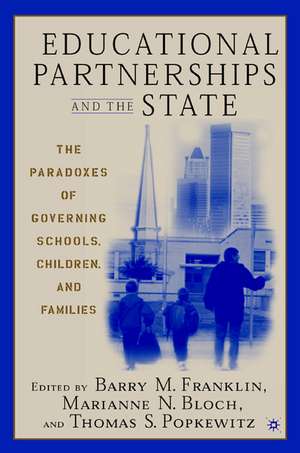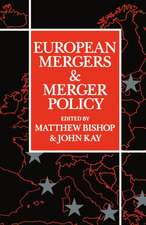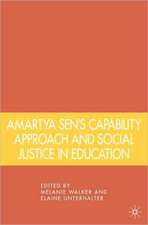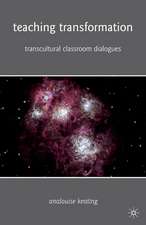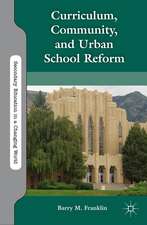Educational Partnerships and the State: The Paradoxes of Governing Schools, Children, and Families
Editat de B. Franklin, M. Bloch, T. Popkewitzen Limba Engleză Paperback – 18 dec 2003
| Toate formatele și edițiile | Preț | Express |
|---|---|---|
| Paperback (2) | 299.09 lei 3-5 săpt. | |
| Palgrave Macmillan US – 18 dec 2003 | 299.09 lei 3-5 săpt. | |
| Palgrave Macmillan US – 17 feb 2004 | 299.79 lei 3-5 săpt. | |
| Hardback (1) | 303.95 lei 3-5 săpt. | |
| Palgrave Macmillan US – 17 feb 2004 | 303.95 lei 3-5 săpt. |
Preț: 299.09 lei
Nou
Puncte Express: 449
Preț estimativ în valută:
57.24€ • 59.54$ • 47.25£
57.24€ • 59.54$ • 47.25£
Carte disponibilă
Livrare economică 24 martie-07 aprilie
Preluare comenzi: 021 569.72.76
Specificații
ISBN-13: 9781403961297
ISBN-10: 1403961298
Pagini: 288
Ilustrații: XII, 273 p. 1 illus.
Dimensiuni: 140 x 216 x 16 mm
Greutate: 0.32 kg
Ediția:2003
Editura: Palgrave Macmillan US
Colecția Palgrave Macmillan
Locul publicării:New York, United States
ISBN-10: 1403961298
Pagini: 288
Ilustrații: XII, 273 p. 1 illus.
Dimensiuni: 140 x 216 x 16 mm
Greutate: 0.32 kg
Ediția:2003
Editura: Palgrave Macmillan US
Colecția Palgrave Macmillan
Locul publicării:New York, United States
Cuprins
Introduction: Educational Partnerships: An Introductory Framework B.M.Franklin ; M.Bloch & T.S.Popkewitz PART I: PARTNERSHIPS AND CHANGING PATTERNS OF GOVERNING Partnerships: The Social Pact and Changing Systems of Reasoning a Comparative Perspectives; T.S.Popkewitz Partnership as a Floating and Empty Signifier within Educational Policies: The Mexican Case; R.Buenfil Burgos PART II: BETWEEN THE STATE, CIVIL SOCIETY, AND EDUCATION Partnerships in a Cold Climate: The Case of Britain; B.M.Franklin & G.McCulloch Educational Action Zones: Model Partnerships; M.Dickson , S.Gewirtz , D.Halpin , S.Power & G.Whitty Partnerships-The Community Context in Miami; M.Y.Baber & K.M.Borman with J.Avery & E.Amador PART III: SCHOOL REFORM AND PUBLIC-PRIVATE PARTNERSHIPS The Public-Private Nexus in Education; H.M.Levin Governance and Accountability in the Michigan Partnership for New Education: Reconstructing Democratic Participation; L.Fendler PART IV: GOVERNING AS A PROBLEM OF INCLUSION AND EXCLUSION Partnerships and Parents: Issues of Sex and Gender in Policy and Practice; M.E.David Partnering to Serve and Save the Child with Potential: Re-examining Salvation Narratives within one University-School-Community 'Service-Learning' Project; M.Bloch , I.Fang Lee , & R.L.Peach
Recenzii
'Barry Franklin's Educational Partnerships and the State could not be more timely. The volume significantly increases our knowledge of the meaning, development, and operation of educational partnerships. Franklin and his colleagues powerfully connect educational partnerships to questions of citizenship development and education for a democratic society. Franklin, simply put, helps us to better understand what educational partnerships are and why genuine and effective partnerships are so crucial for the future of democracy. I enjoyed the book and learned a great deal from it.' - Ira Harkavy Associate Vice President and Director, Center for Community Partnerships,
University of Pennsylvania
'This book provides rich insight into the nature of educational partnerships, which have emerged in recent years as part of a larger effort to reconcile fairness and markets by forging a 'third way' between left and right. In the name of inclusion and equity, these partnerships seek to bring about a devolution of responsibility for education from the state to the civil society and the individual. However, the studies in this book show that, as government abandons the effort to promote equality and as the discourse of democracy becomes the discourse of accountability, individuals find themselves with more responsibility for educational outcomes and less control over educational processes. The authors suggest that, in the end, educational partnerships may leave us with anoverburdened citizen and an irresponsible state.' - David Labaree, author of How to Succeed in School without Really Learning and Professor, School of Education, Stanford University, USA
'Educational Partnerships and the State presents a timely and significant commentary on the complex issues raised by recent attempts by reformers, in the USA and Britain, to use partnerships to link the civil society and the state and, in so doing, to find a 'third way' in policy between excessive reliance on either the state or on markets. The editors and contributors to this book caution that, beneath the appealing rhetoric of partnerships, a number of dangers and paradoxes lurk. Beneath the language of social inclusion, new patterns of exclusion may develop; beneath attempts to expand civil society, the regulatory power of the state may increase. Partnerships to bring the poor into decision-making may ultimately engineer greater parent and community support for institutional goals set by elites. In presenting critical analysis that reveals these kinds of dangers in 'third way' reforms, this volume contributes to a more sophisticated understanding of the policy dilemmas facing reformers and educators today. Policy-makers, scholars, activists, and educators should read this book.' - William L. Boyd, Batschelet Chair Professor of Educational Administration, Pennsylvania State University
'Educational Partnerships and the State presents a timely and significant commentary onthe complex issues raised by recent attempts by reformers, in the USA and Britain, to use partnerships to link the civil society and the state and, in so doing, to find a 'third way' in policy between excessive reliance on either the state or on markets. The editors and contributors to this book caution that, beneath the appealing rhetoric of partnerships, a number of dangers and paradoxes lurk. Beneath the language of social inclusion, new patterns of exclusion may develop; beneath attempts to expand civil society, the regulatory power of the state may increase. Partnerships to bring the poor into decision-making may ultimately engineer greater parent and community support for institutional goals set by elites. In presenting critical analysis that reveals these kinds of dangers in 'third way' reforms, this volume contributes to a more sophisticated understanding of the policy dilemmas facing reformers and educators today. Policy-makers, scholars, activists, and educators should read this book.' - William L. Boyd, Batschelet Chair Professor of Educational Administration, Pennsylvania State University
'Franklin, Bloch and Popkewitz's Educational Partnerships and the State could not be more timely. The volume significantly increases our knowledge of the meaning, development, and operation of educational partnerships. Franklin and his colleagues powerfully connect educational partnerships to questions of citizenship development and education for a democratic society.Franklin, Bloch, and Popkewitz, simply put, help us to better understand what educational partnerships are and why genuine and effective partnerships are so crucial for the future of democracy. I enjoyed the book and learned a great deal from it.' - Ira Harkavy, Associate Vice President, University of Pennsylvania
University of Pennsylvania
'This book provides rich insight into the nature of educational partnerships, which have emerged in recent years as part of a larger effort to reconcile fairness and markets by forging a 'third way' between left and right. In the name of inclusion and equity, these partnerships seek to bring about a devolution of responsibility for education from the state to the civil society and the individual. However, the studies in this book show that, as government abandons the effort to promote equality and as the discourse of democracy becomes the discourse of accountability, individuals find themselves with more responsibility for educational outcomes and less control over educational processes. The authors suggest that, in the end, educational partnerships may leave us with anoverburdened citizen and an irresponsible state.' - David Labaree, author of How to Succeed in School without Really Learning and Professor, School of Education, Stanford University, USA
'Educational Partnerships and the State presents a timely and significant commentary on the complex issues raised by recent attempts by reformers, in the USA and Britain, to use partnerships to link the civil society and the state and, in so doing, to find a 'third way' in policy between excessive reliance on either the state or on markets. The editors and contributors to this book caution that, beneath the appealing rhetoric of partnerships, a number of dangers and paradoxes lurk. Beneath the language of social inclusion, new patterns of exclusion may develop; beneath attempts to expand civil society, the regulatory power of the state may increase. Partnerships to bring the poor into decision-making may ultimately engineer greater parent and community support for institutional goals set by elites. In presenting critical analysis that reveals these kinds of dangers in 'third way' reforms, this volume contributes to a more sophisticated understanding of the policy dilemmas facing reformers and educators today. Policy-makers, scholars, activists, and educators should read this book.' - William L. Boyd, Batschelet Chair Professor of Educational Administration, Pennsylvania State University
'Educational Partnerships and the State presents a timely and significant commentary onthe complex issues raised by recent attempts by reformers, in the USA and Britain, to use partnerships to link the civil society and the state and, in so doing, to find a 'third way' in policy between excessive reliance on either the state or on markets. The editors and contributors to this book caution that, beneath the appealing rhetoric of partnerships, a number of dangers and paradoxes lurk. Beneath the language of social inclusion, new patterns of exclusion may develop; beneath attempts to expand civil society, the regulatory power of the state may increase. Partnerships to bring the poor into decision-making may ultimately engineer greater parent and community support for institutional goals set by elites. In presenting critical analysis that reveals these kinds of dangers in 'third way' reforms, this volume contributes to a more sophisticated understanding of the policy dilemmas facing reformers and educators today. Policy-makers, scholars, activists, and educators should read this book.' - William L. Boyd, Batschelet Chair Professor of Educational Administration, Pennsylvania State University
'Franklin, Bloch and Popkewitz's Educational Partnerships and the State could not be more timely. The volume significantly increases our knowledge of the meaning, development, and operation of educational partnerships. Franklin and his colleagues powerfully connect educational partnerships to questions of citizenship development and education for a democratic society.Franklin, Bloch, and Popkewitz, simply put, help us to better understand what educational partnerships are and why genuine and effective partnerships are so crucial for the future of democracy. I enjoyed the book and learned a great deal from it.' - Ira Harkavy, Associate Vice President, University of Pennsylvania
Notă biografică
EDGAR AMADOR Graduate Student in applied anthropology, University of South Florida, USAJENNIFER AVERY Graduate Student in applied anthropology, University of South Florida, USAM. YVETT BABER Independent Researcher in applied anthropologyMARIANNE N. BLOCH Professor of Curriculum and Instruction, University of Wisconsin-Madison, USAKATHRYN M. BORMAN Professor of Anthropology and Assistant Director, David C. Anchin Center, University of South Florida, USAR. BUENFIL BURGOS Professor of Education, Cinvastev, MexicoMIRAM E. DAVID Professor of Policy Studies, Department of Education and Director, Graduate School of Science Sciences, Keele University, UKMARNY DICKSON Research Officer, Education Policy Research Unit, Institute of Education, University of London, UKLYNN FENDLER Assistant Professor of Education, Department of Teacher Education, Michigan State University, USABARRY M. FRANKLIN Professor and Head of the Department of Secondary Education, Utah State University, USASHARON GEWIRTZ Professor of Education, King's College London, UKDAVID HALPIN Professor of Education and Head of the School of Curriculum, Pedagogy and Assessment, Institute of Education, University of London, UKI-FANG LEE Doctoral Student in curriculum and instruction, University of Wisconsin-Madison, USAHENRY M. LEVIN William H. Kilpatrick Professor of Economics and Education, Teachers College, Columbia University, New York, USAGARY MCCULLOCH Brian Simon Professor of the History of Education, Institute of Education, University of London, UKRUTH L. PEACH Doctoral Student in Curriculum and Instruction, University of Wisconsin-Madison, USATHOMAS S. POPKEWITZ Professor of Curriculum and Instruction, University of Wisconsin-Madison, USASALLY POWER Professor of Education and Head of the School of Educational Foundation and Policy Studies, Institute of Education, University of London, UKGEOFF WHITTY Director of the Institute of Education, University of London, USA
